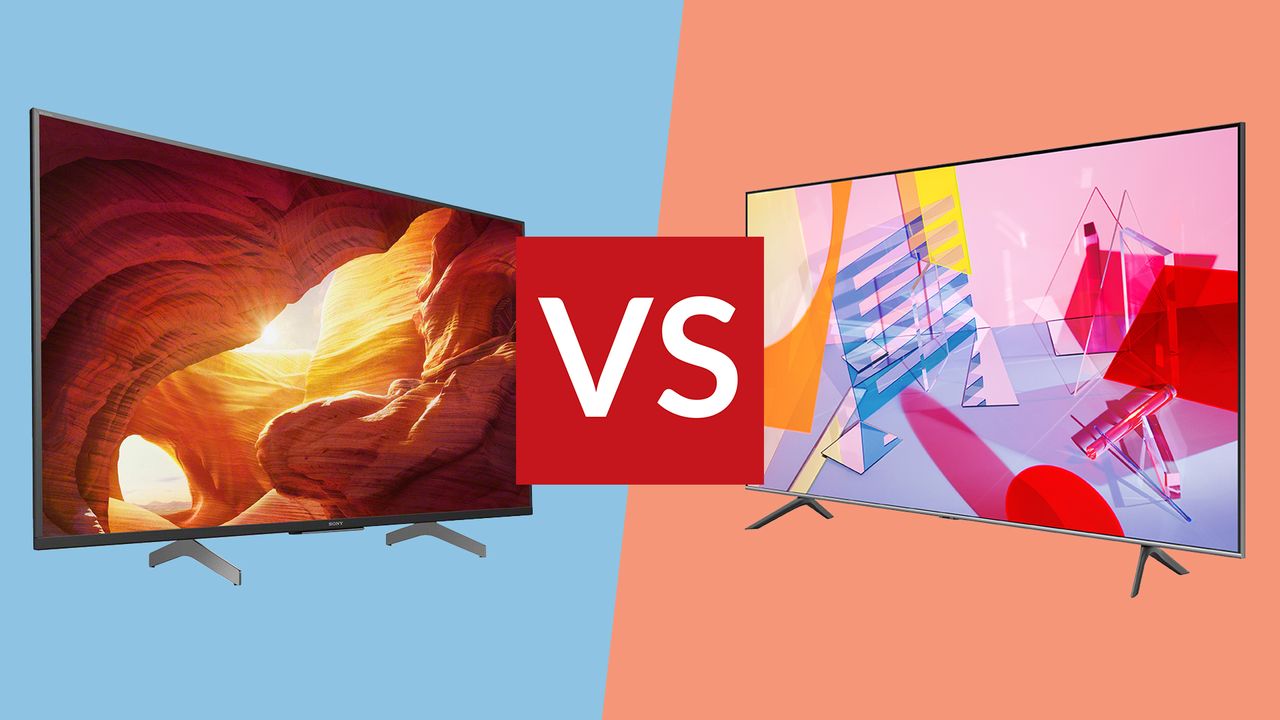

Want to buy a smaller and more affordable TV than you can get from most flagship TVs, but don't want miss out on all the latest features they offer? Let's compare the Samsung Q60T vs Sony XH85 – both are more entry-level models from two of the biggest names in TVs, and are among the best 43-inch TVs around. And both bring some high-end feeling features too.
The Samsung Q60T is the least-expensive set to offer Samsung QLED technology, and features on our lists of the best TVs under £1000 and best TVs under $1000. Similarly, the Sony XH85 brings you features such as its X1 image processing and Dolby Vision and Dolby Atmos support, so you're getting serious tech for much less than Sony's premium sets.
Both also feature the same strong smart TV platforms as their more expensive siblings, so you're not sacrificing usability if you cheaper and smaller.
The Sony XH85 isn't available in the US – the closest equivalent is the Sony X800H.
These are two HDR 4K TVs with competitive pricing and plenty of cutting-edge features, but which one is the ideal choice? Let's compare.
Samsung Q60T vs Sony XH85: Price and screen sizes
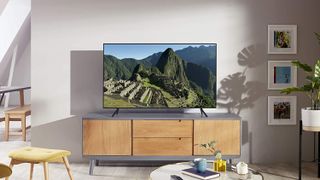
The Samsung Q60T is the cheapest entry in the company’s 2020 QLED range, with competitive pricing and screens to meet every need. There’s 43-inch (£579/$429), 50-inch (£599/$649), 55-inch (£699/$699), 58-inch (£849/$799), 65-inch (£999/$999), 75-inch (£1,299/$1,599) and 85-inch (£1,799/$2,599) sizes.
Conversely, the Sony XH85 is pricier and aimed at the smaller end of the market with only two screen sizes – the 43-inch 43XH8505 (£679), and 49-inch 49XH8505 (£749). So if it’s big-screen action you’re after, the Samsung Q60T is the obvious choice.
Sign up to the T3 newsletter for smarter living straight to your inbox
Get all the latest news, reviews, deals and buying guides on gorgeous tech, home and active products from the T3 experts
Samsung Q60T vs Sony XH85: Design & connections
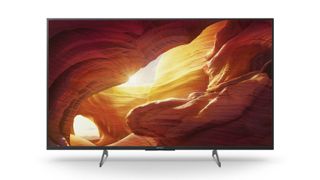
The Samsung Q60T uses a backlight composed of LEDs at the edge of the screen, and this keeps the design sleek and slim. It also benefits from Samsung’s usual high-quality fit and finish, making this model even better value.
There’s a decent set of connections as well, with three HDMI inputs (one eARC-compatible), a couple of USB ports, UK terrestrial and satellite tuners, composite video inputs and a digital optical output. The Q60T also includes Bluetooth 4.2 on board, along with dual-band Wi-Fi (including Apple AirPlay 2 support).
Sony is equally as adept at designing a TV, and the XH85 is a great example. Like the Samsung it uses edge LED backlighting, resulting in a thin chassis with elegant styling and a solid build quality thanks to an attractive metal finish.
The XH85’s higher price tag means more connections, with four HDMI inputs (one with eARC), three USB ports, twin terrestrial and satellite tuners, composite/component video inputs and a digital optical output. There’s also Bluetooth 4.2, dual-band Wi-Fi, Chromecast and AirPlay 2.
Samsung Q60T vs Sony XH85: Picture quality
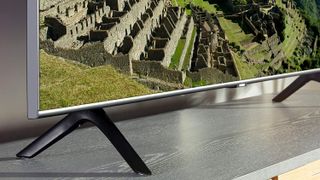
The Samsung Q60T delivers an impressive picture thanks to increased brightness, a wider colour gamut courtesy of QLED, and Dual LED backlight tech that uses two sets of different coloured LEDs to produce more even and accurate light. This approach certainly works with bright, colourful and punchy images that are largely free of blooming compared to cheaper TVs (though obviously is far from the precision that the best OLED TVs can manage).
The Q60T supports every HDR standard except Dolby Vision – so you get HDR10 (the basic standard), HLG (for live broadcast) and HDR10+ (used on Amazon Prime Video and some Blu-rays). As a result this TV performs best with 4K and HDR content, but impressive upscaling will also get the best out of lower resolution images. Finally, this capable TV delivers a sub-10ms input lag for gaming.
The Sony XH85 takes a similar tack, employing a range of proprietary tech such as a TRILUMINOS display and X1 4K HDR processor to deliver an excellent picture. You get images that produce bright highlights and deep colours, while the X-Reality PRO upscaling squeezes every last pixel out of lower resolution source material – Sony has always excelled in this area, and in motion processing, and the XH85 is no different.
The XH85 supports HDR10 and HLG, and while it doesn’t include HDR10+, it can handle the more popular Dolby Vision which is used by Netflix, Disney+. Apple TV+ and numerous Blu-rays. Sony also employs Dynamic Contrast Enhancer and Object-based HDR remaster tech to create increased dynamic range of non-HDR video, which is incredibly effective.
A 15ms input lag for gaming completes this affordable LCD TV's qualifications.
Samsung Q60T vs Sony XH85: Sound quality
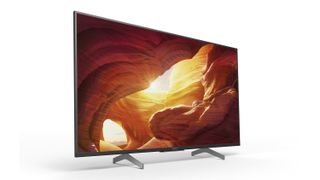
The Samsung Q60T seems acoustically well-specified on paper, with two drivers and 20 watts of power, but this doesn’t translate into an especially accomplished soundstage. The audio is feeble and underpowered, with a vague and muddy delivery.
Thankfully there are any number of affordable options among the best soundbars, and if you go for one of the larger screen sizes you owe it to yourself to beef-up the sonic performance of your TV.
The Sony XH85 has a similar speaker layout based on a pair of full-range bass reflex speakers, each powered by 10 watts of amplification. However Sony parlays this basic audio system into a superior sonic performer thanks to sophisticated digital signal processing and built-in Dolby Atmos decoding.
Despite supporting Dolby’s immersive audio format on its soundbars, Samsung still refuses to include decoding on its TVs.
Samsung Q60T vs Sony XH85: Smart TV
The Samsung Q60T sports the company’s Tizen-derived smart TV system which is employed on every QLED TV up to and including the flagship 2021 4K set, the Samsung QN95A. It’s slick, responsive and very intuitive to use, with a choice of every essential UK catch-up and streaming service. There are two remotes, including a more streamlined unit, the SmartThings app, and built-in Alexa and Bixby smart assistants. It’s an impressive platform that’s unmatched by any other manufacturer.
As with most of Sony’s current TVs, the XH85 uses the Android smart TV platform. This particular system has improved significantly over the last few years, with an improved interface, a faster response and a more robust delivery. There’s an extensive selection of catch-up and streaming services, plus built-in Google Assistant and Alexa compatibility for limited voice control. Sony also includes YouView as part of its TV guide in the UK, which is a welcome addition.
Samsung Q60T vs Sony XH85: Verdict
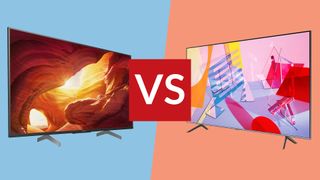
The Samsung Q60T and Sony XH85 both represent the affordable end of their respective companies’ LCD line-ups, but they also retain enough features to ensure you enjoy a higher-end experience when compared to other mid-range models.
The picture performance is evenly matched, although the XH85’s support for Dolby Vision might give that model the edges. The Q60T has a better smart system, while the XH85 delivers superior sound thanks to the inclusion of Dolby Atmos decoding.
Since both TVs offer slim panels and elegant styling, your choice may come down to screen size you want for the budget. If you’re in the market for a sub-50-inch TV the XH85 is definitely worth considering, but if you're after the biggest screen you can get for a given price, the Q60T is an excellent buy.
Steve Withers is a professional calibrator and freelance journalist who regularly contributes to T3, reviewing audio and video products, and writing articles. Steve has been writing about audio and video products for over ten years and, along with T3, he also contributes to TechRadar, Trusted Reviews, Expert Reviews, AVForums, Pocket-lint, Home Cinema Choice, and Wired. Steve is Level 2 certified with THX, the Imaging Science Foundation (ISF) and the Home Acoustics Alliance (HAA). As such, he remains abreast of all AV technology developments and the latest industry standards as we transition into a new era in home video and audio.
-
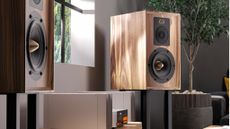 Wharfedale's stunning luxury speakers sit on British steel
Wharfedale's stunning luxury speakers sit on British steelWharfedale's new Aston speakers were built without limits – but there's a limit to how many pairs are being made
By Carrie Marshall Published
-
 I need to watch this HBO thriller series – its upcoming episodes look unreal
I need to watch this HBO thriller series – its upcoming episodes look unrealThe White Lotus is a must-watch
By Max Freeman-Mills Published